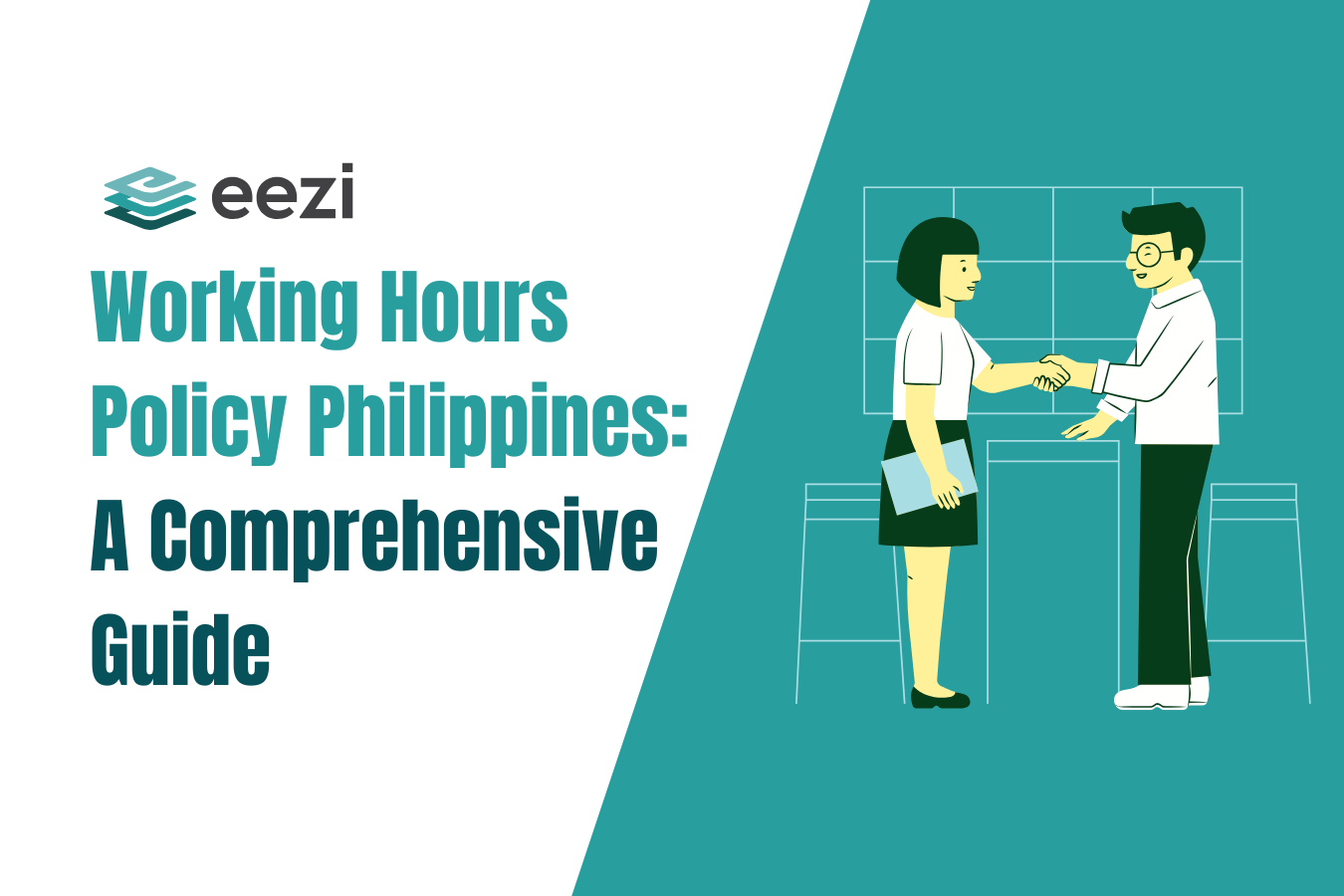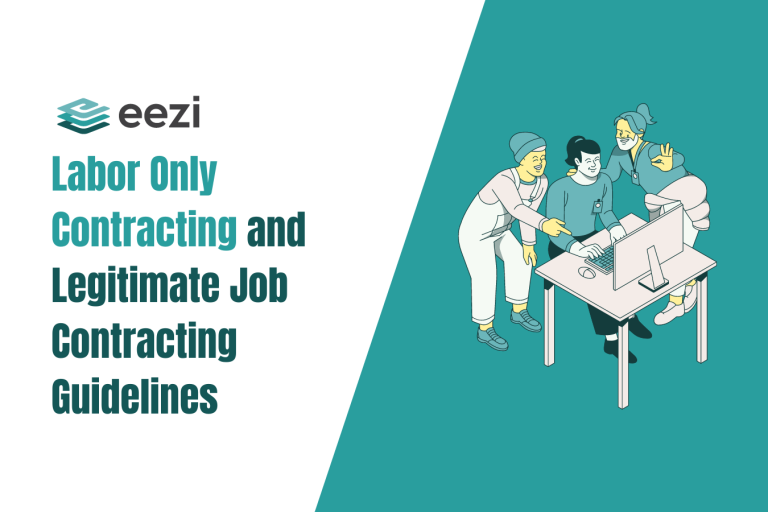What is the working hours policy in the Philippines?
Key Point
- The standard working hours is 8 hours per day, up to 48 hours per week, meal break excluded.
- The common workweek is 5 days (40 hours) or 6 days (48 hours), with some companies using compressed schedules.
- Employment contracts must clearly state the agreed working hours; extra hours must comply with overtime rules.
- Flexible hours and remote or hybrid work setups are allowed if they follow DOLE guidelines.
- Employees working on regular holidays must be paid 200% of their daily rate.
- Employees working on special non-working days get an extra 30% if they report for work; otherwise, “no work, no pay” applies.
- Employees are entitled to service incentive leave, maternity leave, paternity leave, and other leave benefits if provided by the company.
The Philippines has a well-defined work policy that oversees employee hours, overtime regulations, and benefits. Understanding these policies is vital for both companies and employees to comply with labor laws that affect the Filipino workforce.
In this post, we will look at the working hours policy in the Philippines, covering legal working hours, overtime restrictions, rest times, and other important factors that influence the Filipino workforce.
Standard Working Hours in the Philippines
Legal Working Hours
Under the Philippine Labor Code, employees are required to work eight hours every day or a maximum of 48 hours per week, excluding lunch breaks. This applies to the majority of industries and sectors, with the exception of field personnel, managerial staff, and certain government employees.
Workweek Structure
The typical workweek structures in the Philippines are the following:
- Five-day: Employees work eight hours a day from Monday to Friday, for a total of forty hours per week.
- Six-day: Employees work eight hours a day from Monday to Saturday, for a total of forty-eight hours per week.
- Compressed: Some organizations use a compressed work schedule in which workers work longer hours a day but on fewer days per week.
Overtime Pay Rules and Compensation
Overtime is defined as work performed beyond the regular eight-hour workday. The Department of Labor and Employment (DOLE) mandates that employees be reimbursed for overtime labor at rates depending on the following working conditions:
- On regular workdays, an additional 25% of the regular hourly rate is charged for overtime.
- On rest days, special holidays, or regular holidays, overtime work is paid at a rate of 30% more than the regular employee’s hourly rate.
- Night shift differential: Employees who work between 10:00 p.m. and 6:00 a.m. are eligible for an additional 10% of their regular hourly wage.
Related: https://www.eezi.com/calculating-overtime-pay-in-the-philippines/
Overtime Restrictions
While overtime is permitted, excessive overtime work can be harmful to employees’ health. Employers who require overtime work must guarantee that it falls within acceptable boundaries and that employees are adequately acknowledged.
Besides, the Department of Labor and Employment (DOLE) encourages companies to efficiently manage normal hours and ensure employees have appropriate rest. Failure to comply with overtime pay rules may result in penalties ranging from fines to prison, as assessed by the Department of Labor and Employment.
Agreed Working Hours and Additional Hours
What are the agreed working hours?
Many workplaces have agreed to shorter workdays and work weeks than the limits of normal working hours. The employment contract must specify the number of working hours per workday and week. The agreed-upon working hours correspond to those specified in the employment contract.
What are additional hours?
An employee who works more than the agreed working hours while remaining within the limits of ordinary working hours is referred to as working additional hours.
Many employees are entitled to overtime pay even when they are working additional hours. This could, for example, be established in their job contract or in a collective agreement. For employers to order additional hours, the conditions for overtime work must be met.
Rest Periods and Breaks
Meal breaks
Employees are granted at least a one-hour meal break per shift. This is unpaid time; thus, it is not included in the regular working hours. During the day shift, this time off is usually at 12:00 p.m. Moreover, though not explicitly stated in the Labor Code, many businesses provide short breaks of 5 to 15 minutes for practical and health reasons.
Rest Days
The law requires that employees get at least one rest day every week, which is usually on Sundays. However, depending on the nature of the task, rest days may differ. Where such holiday work happens on the employee’s scheduled rest day, he will be entitled to additional compensation.
Night Differential
Article 86 of the Labor Code states that every worker who works between 10:00 p.m. and 6:00 a.m. should be paid a night shift differential of at least 10% over and above the standard hourly rate for each hour worked during that time frame.
If the worker works overtime between 10:00 p.m. to 6:00 a.m., the worker is entitled to receive night shift differential pay and overtime compensation. Similar to overtime laws, administrative and exempt staff may be excluded from night shift differential pay.
Related: https://www.eezi.com/how-to-compute-night-differential-in-the-philippines/
Work-from-Home and Hybrid Work Settings
With the development of remote work, many organizations in the Philippines have implemented work-from-home (WFH) or hybrid work arrangements. While not officially indicated in the Labor Code, the Department of Labor and Employment (DOLE) has issued guidance to ensure compliance with labor rules even in remote locations.
Flexible Work Hours
Some firms utilize flexible working hours, allowing employees to set their own start and end timings as long as they complete the required number of hours each day or week. This strategy rewards employees who value work-life balance.
Holiday Pay and Special Working Days
Regular Holidays
Employees working on regular holidays are entitled to 200% of their daily rate. Some common regular holidays in the Philippines include:
- New Year’s Day (January 1)
- Maundy Thursday & Good Friday (Holy Week)
- Independence Day (June 12)
- Christmas Day (December 25)
Special Non-Working Holidays
Special non-working holidays differ from regular Philippine holidays. They are often specific to local governments or authorities in certain communities, and most are not observed nationwide.
Remember that the country’s “no work, no pay” policy applies to all exceptional non-working days. It is vital to highlight that if they do show up for work, they will get 30% of their daily earnings in addition to their usual compensation.
Leaves and Benefits Related to Working Hours
Employees in the Philippines are entitled to various leave benefits, including:
- Service Incentive Leave (SIL): Five paid leave days per year for employees who have worked at least one year with a company.
- Maternity Leave: 105 days of paid leave for female employees who have given birth.
- Paternity Leave: Seven days off paid leave for married fathers.
- Sick Leave and Vacation Leave: Some companies provide additional leave benefits beyond what is required by law.
Employees working overtime or night shifts need proper compensation, and employers must ensure compliance with labor and employment laws. Additionally, certain industries, such as BPO companies, have unique working schedules that must align with Philippine labor code policies.
Related: List of government-mandated benefits employees should have
Take Away
The working hours policy in the Philippines is designed to protect employees while ensuring businesses operate efficiently. Understanding these labor laws is essential for both employers and employees to maintain compliance and foster a productive work environment.
By adhering to standard working hours, overtime regulations, and flexible work arrangements, companies can create a fair and balanced workplace for their workforce.
For businesses and employees alike, staying informed about labor policies helps in making informed decisions regarding working conditions, benefits, and work-life balance.
Simplify Payroll & Compliance with eezi!
Ensure accurate work hours, OT calculations, and compliance with labor laws—all automated! Try eezi today.



